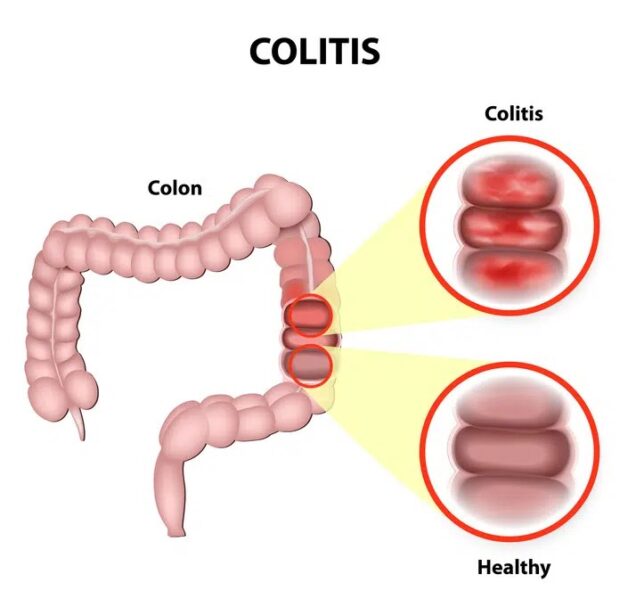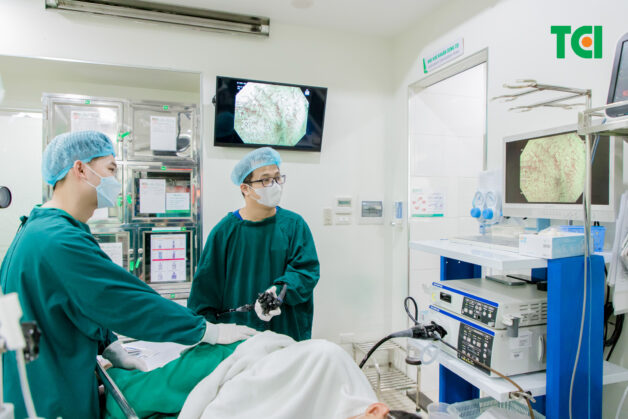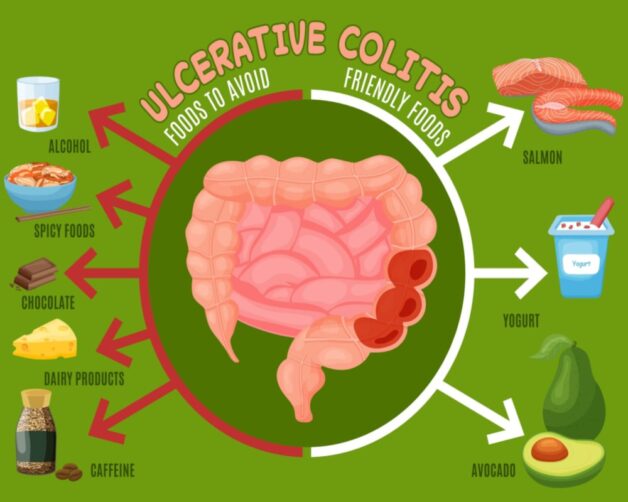Understanding colitis and its appropriate treatment is crucial in preventing potentially harmful complications. This medical discourse explores the details of colitis, its treatment options, and the significance of timely intervention.
1. Colitis and Complications
1.1 Overview
Colitis is an inflammatory process causing damage to the lining of the colon, manifesting as localized or widespread inflammation. The disease presents with complex symptoms, including abdominal pain, disrupted bowel movements, and discomfort such as bloating. Seeking specialized gastrointestinal evaluation for diagnosis and specific treatment plans is vital to avoid complications.

Colitis is an inflammatory process causing damage to the lining of the colon
1.2 Dangerous Complications
Chronic colitis, if left untreated, poses an elevated risk of severe complications, such as:
– Massive bleeding: Unhealed inflammatory lesions become fragile, leading to potential life-threatening intestinal bleeding.
– Perforation: Prolonged inflammation may cause ulcers to penetrate the thin wall of the colon, resulting in perforation, a critical complication.
– Acute colonic dilation: Prolonged inflammation leads to increased bowel constriction, potentially causing a dangerous condition known as acute colonic dilation.
– Colorectal cancer: Long-term colitis significantly increases the risk of developing colorectal cancer. Studies indicate a correlation ranging from 5% after 10 years of illness to 40% after 25 years.
2. Diagnosis of Colitis
Various diagnostic methods for colitis include:
– Stool analysis: For acute colitis, examining fresh stool samples helps identify infections.
– Sigmoidoscopy and colonoscopy: These procedures allow direct visualization of the colon, providing insights into the cause of inflammation.
– Computed tomography CT colonography: Radiological techniques aid in identifying abnormalities in the colon.

A colonoscopy is an examination of the inside of your large intestine, which includes your colon, rectum and anus.
3. Colitis Treatment
3.1 Adopting a Serious Diet and Healthy Lifestyle
Regarding diet:
– Incorporate foods beneficial for colon health, such as soy milk, potatoes, fish, green vegetables, fruits, high-fiber foods, papaya, and potassium-rich bananas.
– Eat frequent small meals, especially avoiding heavy dinners to reduce the burden on the intestines.
– Consume well-cooked and boiled foods, limiting raw or potentially infectious items.
– Manage constipation by reducing fat intake and increasing fiber.

Foods for colitis disease
Regarding lifestyle:
– Control stress to prevent prolonged anxiety, ensuring a positive mindset.
– Engage in regular physical activity, stay hydrated, and include gentle abdominal massages to stimulate bowel movement.
– Be cautious with anti-inflammatory and pain medications, as they may increase the risk of intestinal bleeding.
3.2 Medication-based Treatment for Colitis
Early-stage inflammation of the colon can often be effectively managed with prescribed medications, including:
– Antibiotics to combat infections and anti-inflammatory drugs.
– Pain relievers.
– Anti-diarrheal medications combined with anti-bacterial agents.
– Adequate hydration and electrolyte supplements to prevent cardiovascular complications.
It is crucial to follow the prescribed treatment plan and refrain from self-medicating to ensure the effectiveness of the treatment.
3.3 Surgical Intervention
In cases where colitis progresses or severe complications arise, surgical intervention might be necessary. Common procedures involve removing the inflamed section of the colon. However, surgical options are carefully evaluated, considering potential post-operative health impacts.
Early treatment of colitis significantly improves the chances of recovery. Therefore, proactive medical consultations and periodic gastrointestinal endoscopies are essential for maintaining overall health and preventing severe complications.








